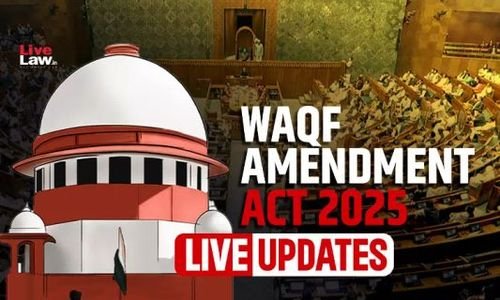Hearing on the petitions challenging the Wakf (Amendment) Act will continue.
The Supreme Court of India is scheduled to continue hearing on Thursday, April 17, 2025, a batch of petitions challenging the constitutional validity of the Waqf (Amendment) Act, 2025. A bench of Chief Justice Sanjiv Khanna and Justices Sanjay Kumar and K.V. Vishwanathan is expected to address the key concerns raised during the previous day’s hearing, including the status of “waqf by user” properties, inclusion of non-Muslims in waqf boards, and the collector’s powers to change the status of disputed waqf lands.
Key developments and concerns
Proposal for interim order: On Wednesday, the Supreme Court proposed to stay some key provisions of the Waqf (Amendment) Act, 2025, including the power to de-notify properties declared as waqf by courts, inclusion of non-Muslims in central waqf councils and boards, and the provision allowing the collector to change the status of disputed waqf lands. However, the Centre opposed the interim order and sought a detailed hearing before any such order is passed.
Arguments by petitioners: The petitioners, including Trinamool Congress MP Mahua Moitra, AIMIM MP Asaduddin Owaisi and senior advocates Kapil Sibal and Abhishek Manu Singhvi, have argued that the Act violates the fundamental rights of Muslims, particularly Article 26, which deals with the freedom of religious denominations to manage their own affairs. They argue that the inclusion of non-Muslims in wakf boards and abolition of "wakf by user" is unconstitutional.
Questions raised by the court: The bench raised several questions, including whether the government would allow Muslims to be part of Hindu religious trusts and whether the concept of "wakf by user" could be discarded, given that many mosques were built centuries ago without formal registration. The court also expressed concern over the possible consequences of denotifying properties declared as wakf by earlier court orders.
Government stand: Solicitor General Tushar Mehta, representing the Centre, defended the provisions of the Act, arguing that registration of wakf properties has been mandatory since the first Wakf Act in 1923. He also said that the new rule would apply only to boards reconstituted after the enactment of the Act and that the government has made provisions for women and marginalised communities.
Public reaction: The passage of the Wakf (Amendment) Act has led to widespread protests and violence, especially in West Bengal. Chief Justice Khanna condemned the violence, calling it "very disturbing". The court has indicated that it will consider the issue of whether the case should be heard by the Supreme Court or referred to the high courts.
Background
Passage of the Act: The Waqf (Amendment) Act, 2025 was passed by the Lok Sabha with 288 votes in favour and 232 against, and the Rajya Sabha with 128 votes in favour and 95 against. The Bill received the President's assent on April 5, 2025, and came into force on April 8, 2025.
Petitioners: The petitions challenging the Act have been filed by various opposition parties, including the Congress, Aam Aadmi Party, YSR Congress Party, AIMIM and others. The petitioners argue that the Act imposes arbitrary restrictions on waqf properties and their management, thereby undermining the religious autonomy of the Muslim community.
Key provisions: The Act includes provisions that eliminate the concept of “waqf by user”, allow non-Muslims to be included in waqf boards, and give the collector the power to determine whether a property belongs to the government or not, even if it is disputed as a waqf property
Continuation of hearing: The Supreme Court will sit again on Thursday, April 17, 2025, at 2 pm to continue the hearing. The bench is expected to hear further arguments from both the petitioners and the government before deciding on the interim order.
Possible outcome: The Court may pass an interim order to stay certain provisions of the Act, refer the matter to higher courts, or continue the hearing to collect more detailed submissions from both sides. The outcome of the hearing could have significant implications on the management of waqf properties in India and the religious rights of the Muslim community.
